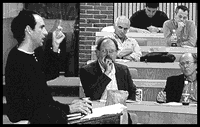
Screenwriting Tips from a Pro
Written by Lorre Fritchy | Posted by: Anonymous
There are three P’s which screenwriter Richard Krevolin deems essential for a successful career. But before you learn them, before you descend on L.A. with your Final Draft software and "Citizen Kane" poster, there are some tips about writing for Hollywood, and writing in general, you should know.
* Start at the finish. Don’t write your script until you know the ending. One thing the pros agree on is that they start writing backwards. It is quite feasible to take ten months to outline your story and one month to write it; the real work is in determining how events will unfold so when the time comes, you know the story you want to write.
* "There’s no room for preciousness," says Krevolin—no cheap and cutesy jokes intended only for the reader. Although there was a short period where "everyone was doing it," this amateurish technique is generally frowned upon. Same goes for overwriting, using lengthy and flowery prose. Just tell the story.
* There are rules of genre which you simply cannot break in the Hollywood realm. "The people who do mess with structure are not family film makers," says Krevolin. "They’re film NOIR makers." Know which one you are and respect the rules of your genre.
* The average movie budget is $50 million, and the average marketing budget $30 million. Is it really so hard to believe that a producer would choose an established writer with a so-so idea over a stellar concept from an unproven scribe? They’re just protecting their jobs. The System is intentionally built to keep people OUT; your job is finding a creative way to get IN.
* If your character hasn’t changed by the end of the story, you fail. This is Krevolin’s (and Hollywood’s) simple grading policy for screenwriters. The good professor used the example of Billy Crystal’s character in "City Slickers" – his Mets cap is a quick and identifiable method to demonstrate Old Billy. After he changes, he dons the cowboy hat, signifying the New Billy. Find a way to show your character’s inward change, short of the annoying habit of having other characters say, "My, how you’ve changed!"
* Hollywood, being star-driven, favors screenplays with strong, castable roles. Stars look for grand revelatory monologues (otherwise known as Oscar clips).
* Agents are close to impossible to get. The three people whose attention you CAN get: entertainment lawyers (generally $250/hour and 5%); independent producers and managers. Agents cannot produce, Krevolin points out; if they want to produce, they become managers. Don’t lose sleep over not having one; you need to do the grunt work yourself on your first spec script anyway.
* Frankly, Hollywood doesn’t give a damn about your theme. Feature films are visual and visceral—it’s about emotional engagement, not intellectual. Want proof? Listen to the soundtrack, says Krevolin; movies manipulate every emotion you feel while you watch. If your screenplay doesn’t get a reader emotionally hooked, you can be as sure of getting rejected as you are to find a t-shirt shop on Hollywood Boulevard.
* * *
You already knew that? Great. Then you’re ready for the Three P’s, according to Richard Krevolin.
Patience. It’s a fact: most people send scripts out too soon. Do your sought-after industry the courtesy of respecting your craft; read the books, do the homework. Take the time to learn the good, the bad, and the Goldman [a reference to William Goldman, of "Butch Cassidy and the Sundance Kid" fame, considered to be one of the most successful screenwriters in the film industry, as well as the author of that staple among screenwriters, "Adventures in the Screen Trade."—ed.]. The two words Hollywood revolves around are "no" and "fear" — don’t give them a technical reason to say no.
For those living outside the L.A.-cosm, patience is even more of a prerequisite. Remember, you’ve removed the ability to meet with a producer at a moment’s notice; you may play phone tag more often; and there’s that pesky time zone factor. A comfort offered by Krevolin is that Hollywood has as many people who will look at writers from outside L.A. as it has people who flat out refuse. Get with writers in your area to hone your skills. Krevolin advises that good writing groups will stay focused, steer clear of their own agendas, and maintain the integrity and vision of the writer’s original idea.
Persistence. Do everything you can to show them you’re serious. Script contests are good feathers in your cap. If you’re not in film school, contests are good ways to build a resume. Making your own film also proves your dedication, but be aware that there are so many people making indie flicks, it packs a less powerful punch than it did a few years ago.
Keep practicing your high-concept pitch. Be able to tell your story in 30 words or less—this is what Hollywood is driven by. It’s the "TV Guide" log line that compels you to set the VCR for the Sunday Night Movie. Usually, it’s a tease of the first act (your theme is in your ending and is not usually included in the log line). If you can’t narrow your story down to one sentence, you may not really know your story. Krevolin maintains, "You have to get their eyes to light up when you tell the one-line pitch." If they don’t say "Wow," it ain’t happenin’ now.
Perseverance. When Krevolin presented a producer with an action film featuring a female protagonist, she replied with one word: "Cable." One unfortunate truth to the industry as it stands is that if a screenplay has a female lead that’s not Meryl Streep, it’s more than likely destined for Lifetime. If this depresses you, you must still move on if you ever want to succeed.
* * *
During one of Krevolin’s appearances, an audience member innocently raised his hand and asked, "You’ve been a screenwriter for seven years, and we’ve never seen one of your movies. What do you attribute your failure to?" (The first P could apply here!) Even with attitudes like this one coming at you—and they will come at you—you must keep writing, keep pushing, and keep pitching.
From where Richard Krevolin stands, persevering despite the odds, obstacles, and odd obstacles is the name of the Hollywood game.
Richard Krevolin’s book, "Screenwriting from the Soul," is available to purchase through amazon.com for $11.96.









